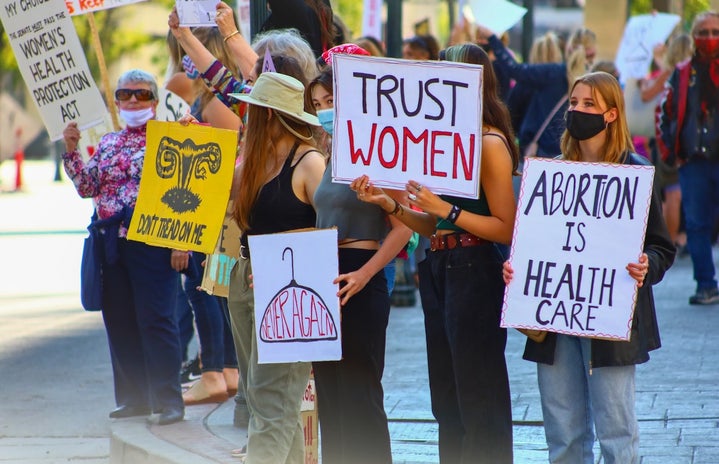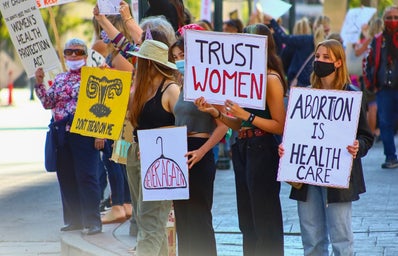With the upcoming election, one of the most present topics is women’s healthcare and the access/morality of abortion. This splits people into mainly two categories: “pro-life” or “pro-choice.” Pro-life argues for abortion to be illegal and save the life of the baby above all else. Pro-choice, on the other hand, argues for pregnant people to be able to access abortion and choose for themselves whether or not it is the right option.
The term “pro-life” is very misleading. The name sounds great; however, “pro-forced birth” is more accurate. This is because every situation requires nuance. The overturning of Roe v. Wade (1973) not only allowed for the illegalization of abortions, but also lifesaving procedures for very wanted pregnancies.
Pro-life should mean support of all life—not just an unborn fetus. The circumstances of the mother are hardly questioned by the pro-life crowd. Could the parents adequately provide for a child? Is it a child of incest or assault? Will the baby be born with congenital disabilities that affect the child’s quality of life? Is the mother going to survive the pregnancy? These questions and more must be considered when discussing a pregnancy’s circumstances. Many pregnant people have had to be forced to go into sepsis and other life-threatening conditions due to the overturning of Roe v. Wade (1973). This is because physicians are now scared to treat their patients due to potentially being sued or losing their medical licenses.
In addition, another argument often made by the pro-life community is that there’s always adoption or foster care. This is such a weak argument. These same people who suggest foster care systems are from the same demographic that vote for politicians who are de-funding these systems. Once again, if one is to call themselves “pro-life,” they have to be able to support said child once it is born and in all stages of life.
Another weak argument is the discussion of late-term abortions—they just don’t happen unless there is a life-threatening situation. No person is going to be 8-9 months pregnant and decide to get an abortion because they don’t want a child. Additionally, despite what some politicians who are pro-life say, no baby is being “aborted” once they are outside the womb. This is by far the most laughable argument yet. Once again, situations like these do not happen, and stories such as these are often fabricated to support one’s position. What stories aren’t fabricated, though, are the ones of women dying in parking lots, on highways, etc., just trying to get to a state that can give them medical care. One story is of a woman with a very wanted pregnancy, Jesseli Barnica, living in Texas, who died after physicians delayed her emergency care as she was having a miscarriage (which is labeled medically as an abortion). The doctors were forced not to help her until the fetus no longer had a heartbeat, and after Jesseli delivered, she died three days later due to an infection. If Jesseli had received abortion care when she arrived at the hospital, she wouldn’t have been as prone to an infection and would still be here with her husband. Abortion is not just for those who lack sexual education—it’s for everybody.
When it comes to those who lack sexual health education, or when contraceptives made by men fail, people are either going to get an abortion safely, or they’re going to complete a backstreet abortion. Backstreet abortions have a very high risk of infection, disability, and even death. People who want abortions are going to obtain them in any way they can, so when there’s a way to provide a medical procedure safely, we need to do it. Some may argue that statistically, the numbers of abortions have gone down, but have they really? In these statistics of abortions, do we actually think the people doing at-home or backstreet abortions are going to report those numbers? Absolutely not. In addition to that, if people who are pro-life want fewer abortions, then make sex-ed more accessible and don’t just preach abstinence (which has been proven to do more harm than good).
Lastly and most importantly, a clear ethical difference exists between life in the womb and a fully formed baby surviving in the outside world. One good analogy to explain this is if a hospital was on fire, and in one room there were five post-utero breathing children, and in another room 50,000 petree dishes of fertilized eggs to be implanted, which do you save? Almost everybody, regardless of being either pro-life or pro-choice, is going to choose the five post-birth children. This displays a separation in people’s ethics and morality when prioritizing life, which is why we always save the mother and prioritize her quality of life.
There are so many more arguments regarding women’s healthcare that could be discussed and countered. Regardless of your view on abortion laws, it is undeniably challenging to make new laws that fit into everybody’s moral compasses. Everybody has slightly different opinions on what is right and wrong, and it is nearly impossible to make laws that satisfy everybody. However, one can be both “pro-life” on a personal level and “pro-choice” at a macro level. Meaning that if you couldn’t see yourself getting an abortion because you think it’s morally wrong—that’s perfectly fine. However, that doesn’t give someone the authority to deny another person the required healthcare. In 2024, women’s health is at stake, and the lack of access to medical abortions is a national emergency. Each and every vote matters in this upcoming election. Please do your research on each candidate’s position and make voting a priority this fall.
Jesseli’s Story: https://www.propublica.org/article/josseli-barnica-death-miscarriage-texas-abortion-ban


